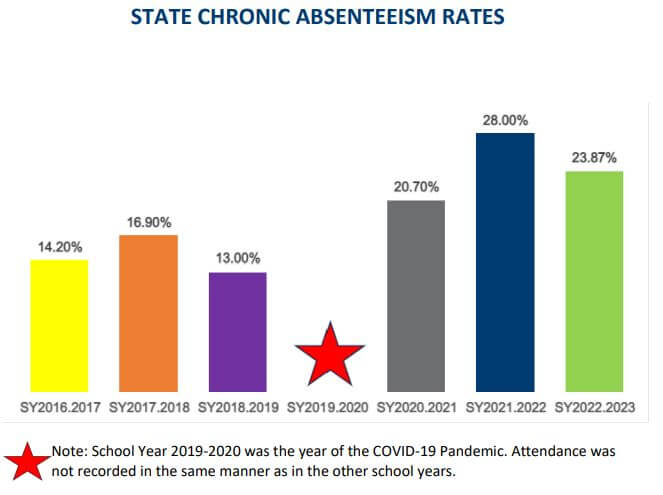Hosemann to focus on lowering chronic absenteeism
July 2 – Lt. Gov. Delbert Hosemann is proposing several policy measures in the 2025 Legislative Session to tackle Mississippi’s high chronic absenteeism rate in public schools across the state.
Chronic absenteeism is defined as missing more than 18 days of the school year, or 10 percent, for any reason including excused absences, unexcused absences, and suspensions. Mississippi’s chronic absenteeism rate for the 2022-23 school year was 23.9 percent. While the rate has begun to trend down since the pandemic, and is lower than some other states, it is still more than 10 percentage points above the state’s 13 percent rate during the 2018-2019 school year.

“If students are not in the classroom, they are not learning. We need to drill down into this data and see where our biggest opportunities for driving up the rate are, particularly regarding unexcused absences,” Hosemann said.\
Among other solutions, Hosemann said he is interested in exploring:
- Restricting the use of cellphones in public schools, which has been shown in recent years to severely impact student mental health, particularly during classroom instruction. Some other states and school districts in Mississippi have already implemented policies banning or restricting the use of cellphones in schools;
- Moving school attendance officers from the Mississippi Department of Education to district-level supervision to encourage better personal relationships between the district, officers, students, and the wider community;
- Increasing school attendance officer salaries. School attendance officers start at $24,528.29 in Mississippi; and
- Encouraging low-performing schools, which often have high chronic absenteeism rates, to consider moving to a modified calendar. A modified calendar more evenly disperses school days throughout the year, provides more short breaks during the school year, and shortens the summer, when students often experience learning loss.
Several bills were introduced in the 2024 Legislative Session addressing school attendance officers with the Mississippi Department of Education’s support, but they ultimately did not pass.
In the early fall when school resumes, Hosemann plans to visit schools in different regions of the state which have lower and higher chronic absenteeism rates to hear about on-the-ground challenges and other possible solutions to the problem. Hosemann has also asked the K-12 and Postsecondary Mental Health Task Force, created by Senate Bill 2727, to examine this issue in the context of child and adolescent mental health and its impact on school attendance and academic performance.






